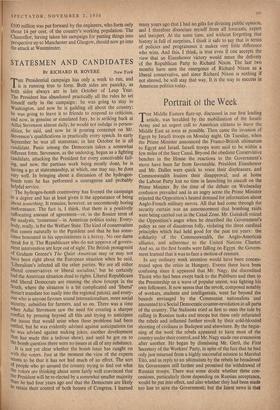STATESMEN AND CANDIDATES
BY RICHARD H. ROVERE New York THE Presidential campaign has only a week to run, and it is running true to form. Both sides are panicky, as both sides always are in late October of Leap Year. The President has abandoned practically all the rules he set himself early in the campaign : he was going to stay in Washington, and now he is gadding all about the country; he was going to leave 'it to friends to respond to criticism, and now, in genuine or simulated fury. he is striking back at Adlai Stevenson almost daily; he would not indulge in person- alities, he said, and now he it pouring contempt on Mr. Stevenson's qualifications in practically every speech. In early September he was all statesman; in late October he is all candidate. Panic among the Democrats takes a somewhat different form. Stevenson, as the underdog, began as a fighting candidate, attacking the President for every conceivable fail- ing, and now, the partisan work being mostly done, he is having a go at statesmanship, at which, one may say, he does very well. In bringing about a discussion of the hydrogen- bomb tests he has performed a courageous and probably helpful service.
The hydrogen-bomb controversy has livened the campaign to a degree and has at least given it the appearance of being about something. It remains, however, an uncommonly boring Performance. The fact is, I think, that there is a positively suffocating amount of agreement—or. in the flossier term of the analysts, `consensus'—in American politics today. Every- body, really, is for the Welfare State. The kind of conservatism that comes naturally to the FVsident and that he has some- times honoured in his appointments is a heresy. No one dares Speak for it. The Republicans who do not approve of govern- ment intervention are kept out of sight. The British protagonist of Graham Greene's The Quiet American may or may not have been right about the European situation when he said, I4beralism's infected all the other parties. We are all either liberal conservatives or liberal socialists,' but he certainly had the American situation dead to rights. Liberal Republicans and liberal Democrats are running the show (except in the South, where the situation is a bit complicated and `liberal' doesn't translate too easily into the regional patois), and every- one who is anyone favours sound internationalism, more social security, subsidies for farmers, and so on. There was a time when Adlai Stevenson saw the need for creating a sharper conflict by pressing beyond all this and trying to anticipate the issues that would arise when these problems had been settled, but he was evidently advised against anticipations (as he was advised against making jokes, another development that has made this a tedious show), and until he got on to the bomb question there were no issues at all of any substance. It is not yet clear whether the bomb issue has caught on With the voters. Just at the moment the view of the experts seems to be that it has not had much of an effect. The sort of people who go around the country trying to find out what the voters are thinking about seem fairly well convinced that the President will be re-elected by a somewhat smaller majority than he had four years ago and that the Democrats are likely to retain their control of both houses of Congress. I learned many years ago that I had no gifts for divining public opinion, and I therefore dissociate myself from all forecasts, expert and inexpert. At the same time, and without forgetting that history is full of surprises, I think it safe to say that in terms of policies and programmes it makes very little difference who wins. And this, I think, is true even if one accepts the view that an Eisenhower victory would mean the delivery of the Republican Party to Richard Nixon. The last two months have seen the emergence of Richard Nixon as a liberal conservative, and since Richard Nixon is nothing if not shrewd, he will stay that way. It is the way to success in American politics today.


































 Previous page
Previous page